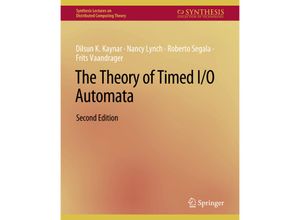This monograph presents the Timed Input Output Automaton (TIOA) modeling framework a basic
mathematical framework to support description and analysis of timed (computing) systems. Timed
systems are systems in which desirable correctness or performance properties of the system
depend on the timing of events not just on the order of their occurrence. Timed systems are
employed in a wide range of domains including communications embedded systems real-time
operating systems and automated control. Many applications involving timed systems have strong
safety reliability and predictability requirements which make it important to have methods
for systematic design of systems and rigorous analysis of timing-dependent behavior. The TIOA
framework also supports description and analysis of timed distributed algorithms -- distributed
algorithms whose correctness and performance depend on the relative speeds of processors
accuracy of local clocks or communication delay bounds. Such algorithms arise for example in
traditional and wireless communications networks of mobile devices and shared-memory
multiprocessors. The need to prove rigorous theoretical results about timed distributed
algorithms makes it important to have a suitable mathematical foundation. An important feature
of the TIOA framework is its support for decomposing timed system descriptions. In particular
the framework includes a notion of external behavior for a timed I O automaton which captures
its discrete interactions with its environment. The framework also defines what it means for
one TIOA to implement another based on an inclusion relationship between their external
behavior sets and defines notions of simulations which provide sufficient conditions for
demonstrating implementation relationships. The framework includes a composition operation for
TIOAs which respects external behavior and a notion of receptiveness which implies that a
TIOA does not block the passage of time. The TIOA framework also defines the notion of a
property and what it means for a property to be a safety or a liveness property. It includes
results that capture common proof methods for showing that automata satisfy properties. Table
of Contents: Introduction Mathematical Preliminaries Describing Timed System Behavior
Timed Automata Operations on Timed Automata Properties for Timed Automata Timed I O
Automata Operations on Timed I O Automata Conclusions and Future Work

